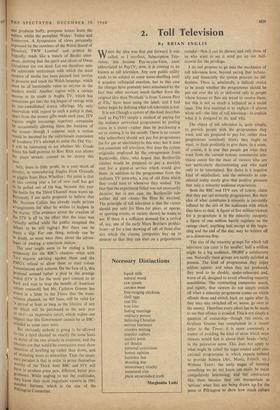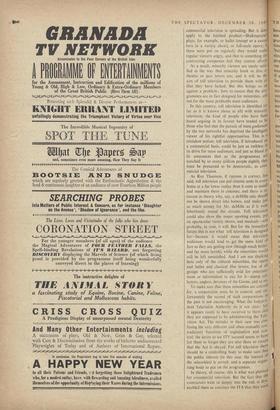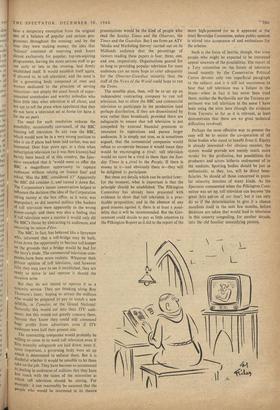2. Toll Television
By BRIAN INGLIS
WHEN the idea was first put forward it was called, as I recollect, Subscription Tele- vision; this became Pay-as-you-View, soon abbreviated to PayTV;.now, it is coming to be known as toll television. Any new public utility tends to be subject to some name-shuffling until it acquires colloquial sanction, but in this case the changes have probably been stimulated by the fact that other services; much farther from the original idea than 'Perelada' is from `Lanson Pere et Fits,' have been using the label; and I had better begin by defining what toll television is not.
It is not (though a system of this kind describes itself as PayTV) simply a method of paying for the ordinary networked programmes by putting coins in a meter--rather than by purchasing a set or renting it by the month. There is no reason why subscribers should not pay for programmes (as for gas or electricity) in this way; but it does not constitute toll television. Nor does the system originally employed by the entrepreneur from Bartlesville, Ohio, who hoped that Bartlesville citizens would be prepared to pay a monthly rent for a piped-in service which would give them, in addition to the programmes from the ordinary TV networks, a run of old films which they could turn to whenever they wished. The fact that the experiment failed was not necessarily decisive; but in any case, the Bartlesville sub- scriber did not choose the films he watched. The principle of toll television is that the viewer should pay only for films (or plays, or operas, or sporting events, or variety shows) he wants to see. If there is a sufficient demand for ,a revival of, say, one of the early Marx Brothers produc- tions—or for a last showing of ork of those clas- sics which the cinema companies buy up to destroy so that they can start on a preposterous remake—then it can be. shown; and only those of us who want to see it need. put up our half- crowns for the privilege.
I do not propose to go into the mechanics of toll television here, beyond saying that technic- ally and financially the system presents no dif- ficulties. There is, admittedly, a difficult choice to be made whether the programmes should be put out over the air or delivered only to people whose houses or flats are wired to receive them; but this is not so much a technical as a social issue. The first essential is to explain—I almost wrote sell—the idea of toll television : to explain what it is designed to do, and why.
The object of toll television is, quite simply, to provide people with the programmes they want, and are prepared to pay for, rather than programmes somebody thinks they ought to want, or finds profitable to give them. In a sense, of course, it is true that people get what they want from the current system; commercial tele- vision caters for the Mass of viewers who are not particularly discriminating and who need only to be entertained. But theirs is a negative kind of satisfaction; and the networks as con- stituted today rarely give that positive pleasure that only a minority audience experiences.
Both the BBC and ITV can, of course, claim that they put out minority programmes. But their idea of what constitutes a minority is inevitably inflated by the size of the audiences with which they have to deal. A figure of five million viewers for a programme is in the minority category; a figure of one million barely registers on the ratings chart; anything less, except at the begin- ning and the end of the day, may be written off as a disastrous flop.
The size of the minority groups for which toll television can cater is far smaller; half a million might be a big audience, 100,000 a satisfactory one. Naturally these groups are rarely satisfied at present. The kind of programmes they enjoy seldom appear; and when they are produced, they tend to be shoddy, under-rehearsed and, worst of all, designed to avoid offending majority sensibilities. The contracting companies assert, and rightly, that viewers do not simply switch off when a minority programme comes on which offends them and switch back on again after it; they may stay switched off or, worse, go over to the enemy. Therefore every effort has to be made to see that offence is avoided. This is not simply a question of censorship—though this exists, as Graham Greene, has complained in a recent letter to the Times; it is more commonly a matter of avoiding the kind of show which most viewers would feel is above their heads—'arty,' in the pejorative sense. This does not apply to what might be called the sugar-coated adult edu- cational programmes in which experts unbend to provide Science (Art, Music, French, etc.) Without Tears: the early stages of learning something we do not know can easily be made compulsively interesting; and the contractors like them because they can masquerade as 'serious' when lists are being drawn up for the press or Pilkington to show how much culture commercial television is spreading. But it doe" apply to the finished product--Shakespeare's plays, for example, or ballet (except as a casu I turn in a variety show), or full-scale opera; ti these were put on regularly they would nial:e regular viewers angry, and that is something the contracting companies feel they cannot afford- As a result, minority viewers are rarely satis' lied in the way that minority book or film or theatre or jazz lovers are; and it will be the aim of toll television to provide them with all that they have lacked. But this brings us LIP against a problem : how to ensure that the pro' grammes are in fact designed for minorities, ad not for the more profitable mass audiences.
In this country, toll television is identified (SO far as it is known about at all) with minoritY television; the kind of people who have been heard arguing in its favour have tended to he . those who feel that the pursuit of mass,etudiences by the two networks has deprived the intelligent viewer of his rightful opportunities. This is a mistaken notion; toll television, if introduced Oa a commercial basis, could be just as ruthless in its drive for mass audiences, and just as bland in its assurances that as the programmes are watched by so many million people nightly 1110 must be presumed to be democratic, as coin- mercial television.
As Roy Thomson, if rumour is correct, Ilas said, toll television can put cinema scats in evcrY home at a far lower outlay than it costs to install and maintain them in cinemas; and there is no reason in theory why, say, a deMille epic should not be shown direct into homes, and make just as much money for Mr. deMille as if it went laboriously round the circuits. Toll tele\ isil n could also show the major sporting events. Pul on spectacular variety shows, and musicals—and probably, in time, it will. But for the immediate future this is not what toll television is designed for—because it would mean that television audiences would tend to get the same kind of fare as they are getting now (though much betti or.
and far more lavish), while the minorities would still be left unsatisfied. And I am not thinking here only of the cultural minorities, the opera and ballet and classical film lovers; but of all groups who are sufficiently avid for entertain- ment or information' to pay for it—stamp col" lectors, anglers, devotees of the Goons, and so..un. To make sure that these minorities arc catered for, a corporation must be in control; and tin' fortunately the record of such corporations in the past is not encouraging. What the Indepen- dent Television Authority do is not clear: 11 ifft it appears rarely to have occurred to them that they are supposed to be administering the Tele" vision Act. The mistake in their case was con' fusing the very different and often mutually con" tradictory functions of organisation and con' trol; the desire to sec ITV succeed seems to have led them to forget they are also there to ensure that the Act is obeyed. For toll television there should be a controlling body to make sure that the public interest (in this case, the interest of the minorities) is served; and a separate organ' ising body to put on the programmes.
In theory, of course, this is what was plann for commercial television. But the fact that I contractors went so deeply into the red, at enabled them to convince the 1TA that they Ili'
ed
lie ,t. ci have a temporary exemption from the original aim of a balance of popular and serious pro- grammes throughout the evening; and by the time they were making money, the idea that 'balance' consisted of reserving peak hours almost exclusively for popular, top-ten-aspiring Programmes, leaving the more serious stuff to go out early or late in the evening, had firmly established itself. It would establish itself again, if allowed to, in toll television; and the need is for a governing body composed of men and women dedicated to the principle of serving minorities—not simply the usual bunch of super- annuated somebodies and worthy nobodies who have little idea what television is all about, and are apt to tell the press when appointed that they do not have a television set at home (or have it for the au pair).
The need for such resolution reduces the Possibility, occasionally canvassed, of the BBC running toll television. In any case the BBC, Which would now be in a very strong position to take it on if plans had been laid earlier, was not interested. Over four years ago, at a time when subscription television (as it was then known) had barely been heard of in this country, the Spec- tator remarked that it 'would seem to offer the BBC a magnificent opportunity to capture audiences without relying on licence fees' and asked, 'Has the BBC considered it?' Apparently the BBC did consider it, and turned it down flat. The Corporation's innate conservatism helped to influence the decision (the idea of the Corporation taking money at the box office, as it were, was unpopular); so did internal politics (the backers Of toll television were apparently in the wrong Power-camp); and there was also a feeling that if toll television were a success it would only slit the BBC's throat by abstracting its audiences, and removing its raison d'être.
The BBC, in fact, has behaved like a ferryman Who, informed that a toll-bridge may be built, turns down the opportunity to become toll-keeper O n the grounds that a bridge would be bad for the ferry's trade. The commerciat television com- panies. have been more realistic. Whatever their Private opinion of toll television, and however little they may care to see it established, they are ready to move in and operate it should the occasion arise.
But they do not intend to operate it as a Minority service. They are thinking along Roy Thomson's lines: hoping to attract the millions Who would be prepared to pay to watch a new deMille, or Camelot, or the Grand National. Naturally this would eat into their ITV audi- ences; but this would not greatly concern them, because they know they could still command huge profits from advertisers even if ITV audiences were half their present size.
The contracting companies would probably be.
Willing to come in to work toll television even if firm minority safeguards are laid down; even if, More important, a governing body were set up Which is determined to enforce them. But it is doubtful whether it would be sensible to let them take on the job. They have become so accustomed to dealing in audiences of millions that they have lost touch with the tastes of the minorities at Which toll television should be aiming. For example: it can reasonably be assumed that the People who would be interested in its theatre presentations would be the kind of people who read the Sunday Times and the Observer, the Times and the Guardian. But I see from an ATV 'Media and Marketing Survey' carried out on its Midlands audience that the percentage of viewers reading these papers is four, three, one, and one, respectively. Organisations geared for so long to providing popular television for mass audiences can no more hope to cater adequately for the Observer-Guardian minority than the staff of the News of the World could hope to run the Times.
The sensible plan, then, will be to set up an independent contracting company to run toll television, but to allow the BBC and commercial television to participate in the production (and perhaps distribution, if they are disseminated by wire rather than broadcast), provided there are safeguards to ensure that toll television is not compelled by external financial pressures to renounce its aspirations and pursue larger audiences. It is simply not true, as is sometimes argued, that the commercial companies would refuse to co-operate because it would mean they would be encouraging a rival: toll television would no more be a rival to them than the Sun- day Times is a_rival to the People. If there is money in it—and obviously there is—they will be delighted to participate.
But these are details which can be settled later: for the moment, what is important is that the principle should be established. The Pilkington Committee has already been presented with evidence to show that toll television is a prac- ticable proposition; and in the absence of any good reasons against it, there is at least a possi- bility that it will be recommended. But the Gov- ernment could decide to pay as little attention to the Pilkington Report as it did to the report of the more high-powered (or so it appeared at the time) Beveridge Committee, unless public opinion is stirred into acceptance of and enthusiasm for the scheme.
Such is the force of inertia, though, that even people who might be expected to be interested appear unaware of the possibilities. The report of a Tory committee on the future of television issued recently by the Conservative Political Centre devotes only one superficial paragraph to the subject; and it is still not uncommon to hear that toll television was a failure in the States—when in fact it has never been tried there; neither the Bartlesville nor the Toronto ex- periment was toll television in the sense I have been using the term here (though the evidence from Toronto, so far as it is relevant, at least demonstrates that there are no great technical difficulties involved).
Perhaps the most effective way to present the case will be to secure the co-operation of all those bodies who stand to benefit from it. Equity is already interested—for obvious reasons; the system would provide not merely much mire money for the profession, but possibilities foi producers and actors hitherto undreamed of in the medium. Sporting bodies should be just w enthusiastic, as they, too, will be direct bene. ficiaries. So should all those concerned in popu- lar minority interests of many kinds. As the Spectator commented when the Pilkington Corn. mittee was set up, toll television can become 'tit( great Arts patron of our time'; but it can only do so if the determination to give it a chance manifests itself in the next few months, bawl decisions are taken that would lead to televisior in this country congealing, for another decade into the old familiar unsatisfying pattern.




































 Previous page
Previous page